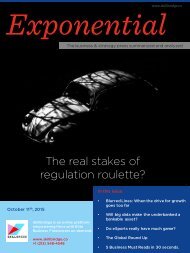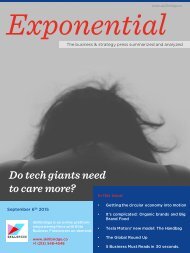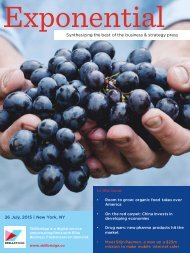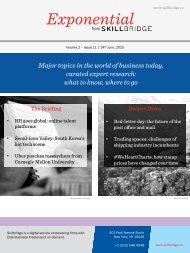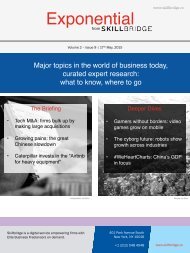Exponential August 9th, 2015
In this issue: Silicon Valley's Mobile bet wins big; Why Nikkei is buying the FT and we ask at 50 is Singapore the world's greatest city state? What does the CFA do beyond the exam?
In this issue: Silicon Valley's Mobile bet wins big; Why Nikkei is buying the FT and we ask at 50 is Singapore the world's greatest city state? What does the CFA do beyond the exam?
You also want an ePaper? Increase the reach of your titles
YUMPU automatically turns print PDFs into web optimized ePapers that Google loves.
www.skillbridge.co<strong>Exponential</strong>The business & strategy press summarized and analyzedSilicon Valley’s Mobilebet wins big.In this issue:• The Global Round Up<strong>August</strong> 9 th , <strong>2015</strong> | New York, NYSkillbridge is an online platformempowering firms with EliteBusiness Freelancers on demand.www.skillbridge.co+1 (212) 548-4548• 5 Business Must Reads in 30 seconds• In the pink: Nikkei ready to buy the FT• Back in the game: Nokia moves into VR• The Interview: Sviatoslav Rosov of theCFA Institute on the future of financialmarkets and blockchains1 +1 (212) 548 4548 www.skillbridge.co
<strong>Exponential</strong> the Skillbridge MagazineThe global round-upAmerican economy growsAfter an apparent winter slowdown,the American economy is showingsigns of spring growth. TheCommerce Department said thatGDP grew at a seasonally adjustedrate of 2.3% in the second quarter. Ina surprise revision, the departmentstated that the economy had actuallyexpanded by 0.6% in the firstquarter. A 0.2% contraction hadbeen previously reported.Mexico opens up oil marketswaklingsf viaflickrFor the first time in 80 years, Mexicois opening up its oil industry toforeign firms. The existingmonopoly Petroleos Mexicanos(PEMEX) can expect competitionfrom the likes of Royal Dutch Shelland Exxon Mobil. The first of threeauctions of oil blocks will take placein <strong>August</strong>. The early sale is beingused to test whether the valuationsof firms and the incumbentgovernment are at similar levels.2 +1 (212) 548 4548 www.skillbridge.co
<strong>Exponential</strong> the Skillbridge MagazineSolvay to buy Cytec IndustriesThe Belgium-based chemical giantSolvay SA has announced that it is buyingUS competitor Cytec Industries Inc for areported sum of $5.5 billion. Solvay planto use the acquisition to positionthemselves as a leading firm in themarket for composite materials used inthe manufacture of airplanes and highendcars. CEO Jean-Pierre Clamadieuwelcomed the move as a “big entry intoaerospace”.Proposed changes to online paymentservices rules in ChinaThe Chinese government is consideringregulatory changes which could compelinternet companies such as AlibabaGroup and Tencent to offer the onlinepayment services of their competitors atthe same time as their own. The policycould have dramatic implications for theonline payment market where Alibaba’sAliplay currently dominates. Onlinepayment is surging in China with theproliferation of smartphones.3 +1 (212) 548 4548 www.skillbridge.co
Winners and LosersGood Week For: Sony and selfiesAfter making losses in six of the past seven years,Sony is back in the black. Executives expect atripling in profits in the April-June quarter with netincome rising to $665 million. The results werelargely due to strong sales of videogame consolesand smartphone image sensors.Bad Week For: AudiAudi AG, the world’s second-biggest luxury carmaker, has downgraded its global annual salesforecasts. Slowing demand in China which is Audi’slargest regional market is largely responsible. Bycontrast, Mercedes-Benz has recorded a Chinesesales surge of 39%.Good Week For: RBS and the British taxpayerThe Royal Bank of Scotland, whose pre-crashaggression almost brought the historic bankinggroup to its knees, has posted a surprise profit. Thegroup which is now partly owned by the UKgovernment announced a net profit of $460million in the second quarter.Bad Week For: Shell workersIn the face of a downturn in oil prices, Royal DutchShell PLC is cutting 6,5000 jobs this year and plansto slash capital investment by $7 billion. Shellreported a 38% decline in adjusted profits for thesecond quarter.4 +1 (212) 548 4548 www.skillbridge.co
<strong>Exponential</strong> the Skillbridge MagazineBack in the game:Nokia moves into VRSource: NokiaWelcome signs of life at NokiaIn July - just over a year after acquiring Nokia -Microsoft wrote down the full value of the Finnish’sfirms handset business. Now Nokia appears to be on thecomeback trail. The company is preparing to release the“Ozo” which it has described as “the first commerciallyavailable virtual reality camera designed and built forprofessional content creators”. The Ozo resembles afuturistic soccer ball and houses a set of cameras andmicrophones which allow video and audio to be capturedfrom virtually every angle.5 +1 (212) 548 4548 www.skillbridge.co
<strong>Exponential</strong> the Skillbridge MagazineSilicon Valley’s Mobile betwins big• Facebook quarterly revenues hit $4bn for the first time.• Almost $3bn of sales now come from mobile adsAdverting revenues go mostly mobile.Facebook’s focus on mobile advertising is paying offhandsomely. To the surprise of investors, the social mediagiant posted second quarterly figures that exceededexpectations. Significantly, over 75% of the firm’s record$4 billion quarterly revenue came from mobile ads. The FTreports that analysts are attributing the firm’s success toFacebook’s newsfeeds which mix user content withautomatic video advertising.6 +1 (212) 548 4548 www.skillbridge.co
<strong>Exponential</strong> the Skillbridge MagazineFaceoff: Google and Facebook square up for mobile revenuesFacebook and Google look set to increase their dominance ofthe mobile advertising landscape. Research companyEmarketer estimates that Facebook and Google are poised tocapture more than half of the nascent $69 billion market forhandheld ads. Google is in pole position with more than 35% ofmarket share but Facebook’s revenues are growing faster.Competitors to the big two look vulnerable. At the end of July,Twitter’s shares weakened as the company reported slowgrowth in new users. At the same time, Yelp’s marketcapitalisation was also down by 25% after the site lowered itsrevenue expectations.US smartphone usersspend one minute outof every five onFacebook, Messengeror Instagram.Keep an eye on costsDespite Facebook’s impressive figures, the WSJ sounds severalnotes of caution. After the results were published, the firm’sshares actually fell by 3% due, in part, to ongoing concernsabout rising costs.Facebook’s spending has jumped significantly, particularly in itsnew hires. Almost 900 extra personnel have been added to theworkforce. The total is now close to 11,000 – or 52% higher thana year ago. As well as recruiting new workers, Facebook isinvesting heavily in data centers and long-term projects such assolar-powered drones.What the brains think…In a recent study of more than 20,000 European consumers in2013-14, McKinsey estimates that social media encourages 26%of purchases - substantially higher than the 10-15% figureposited by other researchers. Jacques Bughin, a McKinseydirector, points out that nuances are crucial when breakingdown the figures. Strong disparities exist across sectors. Fortravel, investment advice and over-the-counter drugs, 40-50%of consumers relied on social recommendations. Timing issimilarly important. A first-time purchaser is around 50% morelikely to depend on social media than a repeat buyer. Crucially, asmall number of “power influencers” hold sway in the world ofsocial media. In categories such as clothing and shoes, 5% ofcommentators account for 45% of total social influence.Facebook’s annual netincome fell by 9.1% to$719 million.Key Reading• WSJ: Facebook,Google Tighten Gripon Mobile Ads• FT: Mobileadvertising propelsFacebook revenues• McKinsey Quarterly:Getting a sharperpicture of socialmedia’s influence7 +1 (212) 548 4548 www.skillbridge.co
<strong>Exponential</strong> the Skillbridge MagazineIn the pink: Nikkei groupmoves for the FT• The Nikkei group is closing a deal to buy the FT for an estimated $1.3 billion• The FT has more than 500,000 digital subscribersThe ink driesThe famous salmon pages of the Financial Times lookset to acquire a new owner. After reportedly fending offcompetition from the German media conglomerate AxelSpringer, the Nikkei Group is closing in on a $1.3 billiondeal to buy the venerable London publisher from itsparent company Pearson PLC. Nikkei’s flagshipnewspaper enjoys a domestic circulation of 3 million butthe Japanese group has found it difficult to break intointernational markets.8 +1 (212) 548 4548 www.skillbridge.co
<strong>Exponential</strong> the Skillbridge MagazineBetting on growthWhile Pearson has relinquished the London-based paper tofocus on its core education business, the Nikkei group is lookingto use the FT as a “fast ticket” to global expansion.Ken Doctor, author of Newsonomics, points out that the FTboasts an editorial team of roughly 500 journalists in more than50 locations. By contrast, Nikkei’s “huge staff” is concentratedon serving their predominately Japanese readership. Doctoropines that the FT’s “reporting resources could be redeployed inKorea, Hong Kong, Singapore and maybe China”.Nikkei generated $2.4billion in revenue lastyear more thanquadruple the FTgroup’s sales.Digital subscriptions are keyThe profitability of Nikkei’s acquisition depends on their abilityto sell digital subscriptions. The Japanese media titan alreadyboasts 430,000 digital subscribers but this impressive figure isput in the shade by the FT’s 500,000 online buyers.Emile Feldman, a Wharton management professor, argues thatthe FT has been a “leader in managing [the trend towards]digital subscription”. The FT has proved particularly adept inconverting readers into paid subscribers when they reach theirlimit of free articles. With this pedigree, the FT “is probably theright [partner] for the Nikkei”.The privately-heldNikkei group boastsmore than 3 millionprint and digitalsubscribers.What the brains think…Newspapers are frequently seen as analog businesses strugglingto meet the demands of the digital age. In a strategy article forthe HBR, Scott Anthony argues that the media industry canprovide salient lessons about digital business models.A common reaction to digital disruption is to create new digitalunits which have significant independence from the rest of afirm. Anthony counsels business leaders to take a moreintegrated, two-step approach which he dubs Transformation Aand Transformation B. Using this hybrid method should ensurethat CEOs do not make a false choice between “using digitaltechnologies as a way to improving operations or using digital asa platform for new growth.”Key Reading:• FT: FT provides ‘fastticket for Nikkei’sglobal expansion• HBR: What themedia industry canteach us about digitalbusiness models9 +1 (212) 548 4548 www.skillbridge.co
<strong>Exponential</strong> the Skillbridge MagazineAt 50 is Singapore theworld’s greatest city state?• The country is made up of 63 islets including the main Singapore Island• The population of 5.6 million is 100% urbanizedIn just 50 years…In 1965, Singapore was expelled from a brief-livedfederation with Malaysia, its neighbour to the north. Fiftyyears later, the country - widely considered to be theworld’s only functioning city state - is a beacon ofprosperity. In 2014, Singapore’s GDP per capita stood at$88, 300 - the seventh highest in the world. The countryhas exceptionally low crime rates, an efficient bureaucracyand virtually no corruption. The Singaporean people havemuch to celebrate.10 +1 (212) 548 4548 www.skillbridge.co
The BriefingThe Briefing<strong>Exponential</strong> the Skillbridge MagazineFive keyreadsHBR: What You Miss When You Take Notes on YourLaptopDISTRACTIONS; TECHNOLOGY – The next timeyou reach for your tablet during a meeting, you mightpause for thought. A study by Pam A. Mueller atPrinceton and Daniel M. Oppenheimer at UCLA hasfound that using a laptop is less effective than takinglonghand notes. Typing into a laptop or tablet meansthat you do not take in new materials as well, mainlybecause typing leads to “verbatim transcription”. Theresearchers conducted three separate studies tocontrol for different variables. The most intriguingfinding was that, although using an electronic deviceencourages more notes to be taken, the user is still ata disadvantage in recalling information whencompared to a pen-wielding counterpart.aiigle_dore via flickrQuartz: A startup from Israel has accidentallycreated “WhatsApp for the deaf”TECHNOLOGY; START-UPS– Stories of digitalserendipity are relatively uncommon. The success ofGlide – an app to quickly send short videos withoutthe hassle of setting up a Skype call – belies thetrend. Jonathan Caras and his Jerusalem-basedteam founded the app in 2013, designing the programas a WhatsApp for sending short video clips. A yearlater, the Glide team discovered that they were a hitamong America’s sign-language community. Carasreports that hearing-impaired users feel they canexpress themselves more naturally through videorather than relying on written messages. Glidecurrently has 20 million registered users and hasraised more than $25 million in venture capitalfunding. Although more than 4 million people in theUS are deaf or hard of hearing, concentrating on asmall niche is unlikely to be a profitable strategy.12 +1 (212) 548 4548 www.skillbridge.co
WSJ: IKEA Gets Deeper Into the WoodsIKEA; COMMODITIES– IKEA is branching out. In aneffort to gain more control over their wood supplies, theSwedish retailer has recently bought an 83,000 acreRomanian forest – the first time it has opted to manageits own woodland. Last year, the furniture colossus used530 million cubic feet or the equivalent of 14 EmpireState buildings. IKEA’s longer-term strategy requiresmore efficient use of wood. In 2012, the firm set a targetof doubling sales by 2020. In the same period, thecompany is aiming to increase the amount of wood ituses by only 50%.Bloomberg: How Spain Fixed its EconomyThe BriefingFive Key Reads<strong>Exponential</strong> the Skillbridge MagazineSPAIN; ECONOMY; AUSTERITY– In <strong>August</strong>, Spainposted its strongest quarterly growth since 2007. Thegovernment predicts growth of 3.3% for the year as awhole. Bloomberg reports that Spain’s success cannotbe taken as a simple vindication of the austerity policiesdemanded as part of the EU’s 100 billion euro 2012rescue package. While VAT increases and public-sectorwage and benefit cuts might have improved fiscaldiscipline, Spain’s retailers have profited from a dose ofgood luck. Eurozone inflation is low, the euro is cheapand energy prices have fallen significantly.HBR: You’re already more persuasive than you thinkOFFICE POLITICS; PERSUASION– Employees oftenassume that their power to influence their bosses isconstrained by their position. Writing in the HBR,Vanessa K. Bohns points to research that might makeworkers think again. Bosses who comply with requestsgenerate justifications for their actions. “If I grantedthis person’s request, I must like him or her” is basicallyhow the unspoken thought process works”. Rather thanfeeling irritated, a person who grants a request tends tofeel good about the person who made the demand.Following this logic, Bohns suggests that “the best wayof smoothing conflict … may not be to offer help but toask for help.”13 +1 (212) 548 4548 www.skillbridge.co
<strong>Exponential</strong> the Skillbridge MagazinehThe Interview• This week’s interview is with Sviatoslav Rosov, PhD ofthe CFA institute.• The mission of CFA Institute is to lead the investmentmanagement profession globally. Their focus is onpromoting the highest standards of ethics, education,and professional excellence for the benefit of society .• Beyond their renouned exam, they work withregulators around the world to shape legislation, settechnical standards and promote industry bestpractices, which put investors’ interests first - DrRosov talks to us about this.Full version,including DrRosov’s fuller viewson the role andimpact oflegislation onmarkets.www.skillbridge.co/rosovWhat’s the area that you and yourteam are specifically working on, andwhat’s the impact of this?I’m part of the Standards andAdvocacy group with a focus on thecapital markets, and my work iscentred on issues relating tosecurities markets – mostly equitymarkets. Currently the topic ofmarket structure and high frequencytrading is attracting a lot of attentionbecause nobody is really sure whetherrecent legislation has been effectivein achieving ‘better’ markets. Withmost of our members working insome kind of investment role this isobviously of great interest.Modern markets have become veryfragmented with numerous tradingvenues in each region and the tradingitself is increasingly being done byalgorithmic high frequency traders(HFT) – essentially computerstrading with themselves.On the one hand investors,particularly retail investors, havenever had it so good with historicallylow spreads. On the other hand, noone is really sure what the hollowingout of market participants means forthe future. In simple terms, there isnow a market-making computer andan aggressive profit-seekingcomputer in the market and relativelyfew other players . There is concernabout what will happen when one ofthose computers’ algorithms tells it toexit the market in response to someshock – who will be left?What do you see as the next maintrend in your sector?Clearly the issue of HFT isunresolved and there doesn’t seem tobe an obvious solution. If the netimpact of HFT turns out to be benignthen it is likely that we will see itincrease in importance, althoughthere are signs that competitionwithin the HFT industry may becausing it to plateau already.14 +1 (212) 548 4548 www.skillbridge.co
<strong>Exponential</strong> the Skillbridge MagazineDeeper DivesWe heart h chartsTrane de Vore via flickrCan social media influenceconsumers?Top influencers in social media have unexpected powerThere are profound differencesbetween power influencers andthe long tail of other socialcommentators. Just 5% of keyinfluencers drive 15% of totalrecommendations.Source: McKinsey & CompanyManufacturing isn’t deadIs Singaporean manufacturing stillalive and well?As well as being a hub for shippingand logistics, the Singaporeaneconomy has retained historiclevels of manufacturing whichcompare well with Hong Kong, itsclosest peer.Source: Thomson Reuters in the EconomistChildren in China failing to receive/complete educationIs getting an education difficult for thechildren of Chinese immigrants?Concerning UNICEF figures points to ageneration of “left-behind” children inChina. UNICEF suggests that up to amillion children of Chinese migrants arenot receiving formal schooling.Source: Unicefin Quartz16 +1 (212) 548 4548 www.skillbridge.co




